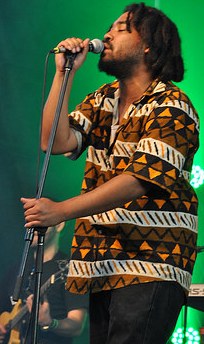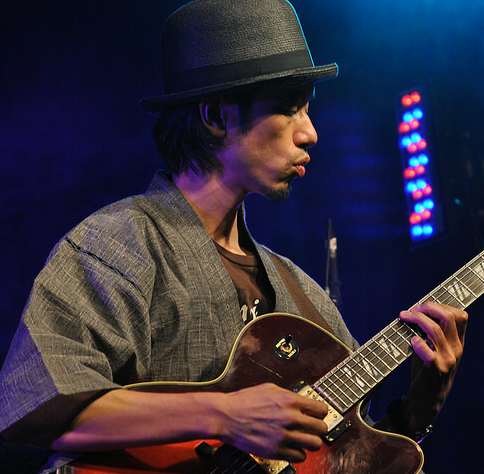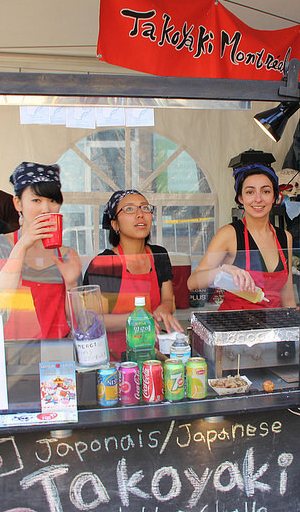Now
in its 13th year, the internationally renown Longueuil
International Percussion Festival (July 6-13th)
continues to evolve. From its humble origins as a small percussion
festival, it is now a major, week-long, 95%-free cultural event
-- with an emphasis on music -- that offers both entertainment
and learning opportunities especially aimed at the young.
 For
an entire seven days, along a six block stretch of Old Longueuil
that is closed down to traffic, a foreign culture is offered
an exceptional platform to showcase its art, music, dance, indigenous
colours and cuisine.
For
an entire seven days, along a six block stretch of Old Longueuil
that is closed down to traffic, a foreign culture is offered
an exceptional platform to showcase its art, music, dance, indigenous
colours and cuisine.
For
their energy and accomplishment, the perennial organizers, France
Cadieux and Gilbert Lucu, are rightfully respected for both
their roles as unacknowledged ambassadors and inspired programmers.
Their message is clear: they want to dissolve borders, they
want to bring the margins to the center, and they are persuaded
that the best time in life to learn about tolerance is during
childhood – and like learning a second or third language,
the younger the better.
Never
before have there been so many activities planned for kids.
Unlike most of Montreal’s many summer festivals, this
one is first and foremost a family affair. From art, music and
dance instruction to skipping rope or whisking down a slide,
there was ample opportunity for kids to seamlessly have fun
and learn. In the many designated areas set aside for the next
generation, which included a circus stage with gymnasts and
acrobats, there were monitors and baby sitters for parents who
wanted to get away for a moment and try the Sapporo beer as
a first introduction to this year’s invited country –
Japan.

Japanese
history, in its early years influenced by China, comes into
its own in the 6th century with the introduction of Buddhism.
From that period on, it evolves its music, language and culture
and becomes one of the most respected, powerful and peaceful
nations of the world. Its culture is multi-faceted and Longueuil
made sure all the major facets were well served.
 For
purists who don’t like their drumming compromised by melody,
there were several stages (sumba.com) and many concerts that
featured strictly percussion. We learn from taiko drumming that
the Japanese have evolved their own form of percussion jazz.
The lead drummers, following precise musical notation which
requires being in perfect rhythmic sync, introduce a motif which
becomes the take off point for a soloist drummer (like a lead
guitarist) who improvises off the main theme.
For
purists who don’t like their drumming compromised by melody,
there were several stages (sumba.com) and many concerts that
featured strictly percussion. We learn from taiko drumming that
the Japanese have evolved their own form of percussion jazz.
The lead drummers, following precise musical notation which
requires being in perfect rhythmic sync, introduce a motif which
becomes the take off point for a soloist drummer (like a lead
guitarist) who improvises off the main theme.
The
large taiko drums lend themselves to visual arts equivalent
of expressionism. The no-nonsense group Raging Asian Women,
for whom subtlety is a luxury not everyone can afford, entered
into the public domain their frustration with the slow progress
of woman’s liberation. As they whipped and whacked their
batons against the tight drum skins, we suspected there was
more at stake than strictly music.
For
those who require a daily measure of melody and song, the Longueuil
Festival is anything but a one-trick pony. Variety is its signature
and mission statement. Besides classical Japanese, there were
all sorts of different musics (reggae, hip hop, flamenco) to
choose from on the smaller stages from noon until late at night.

To
a certain extent, the appreciation of any foreign culture is
always a challenge in that we are most comfortable with the
one we have been raised in. This year provided an excellent
 opportunity
to familiarize ourselves with the Japanese (oriental) pentatonic
scale. In the key of C on the piano, our diatonic scale consists
of 12 notes (both black and white keys). The Japanese or pentatonic
scale consists of the five black keys. Our diatonic scale is
more interval rich, which forces the conclusion that pentatonic
music is unvarying and predictable. But even the uninformed
ear could not help but to be impressed with the play and virtuoso
plucking of Ryoko Itabashi on her 3-stringed shamisen guitar.
opportunity
to familiarize ourselves with the Japanese (oriental) pentatonic
scale. In the key of C on the piano, our diatonic scale consists
of 12 notes (both black and white keys). The Japanese or pentatonic
scale consists of the five black keys. Our diatonic scale is
more interval rich, which forces the conclusion that pentatonic
music is unvarying and predictable. But even the uninformed
ear could not help but to be impressed with the play and virtuoso
plucking of Ryoko Itabashi on her 3-stringed shamisen guitar.
Bridging
the gap between the past and present was fusion artist Likkle
Mai, whose winning, high pitched, molten voice (which left the
nearby windows intact) took reggae, rap and hip-hop to  another
level.
another
level.
For
the eye, there was a considerable sampling of traditional Japanese
dance and art as well as a martial arts stage. There was also
a mini-bar and stage dedicated to Brazilian music, and a special
booth for the Bahia dancers who every year take their suppleness
and sensuality to the streets in canavelesque fashion.
Japanese
cuisine was out in full force. Included were the usual scrumptious
suspects: sushi, tempura, but there was also a stand that offered
an inside outdoor view of how takoyaki, (ginger flavoured octopus
balls) are made. As word got around, the lineups for this exquisite
dish got  longer.
Inside the Kokoro tent there were demonstrations on the preparation
of the more complex Japanese dishes and sauces as well as a
host of cultural events throughout the day.
longer.
Inside the Kokoro tent there were demonstrations on the preparation
of the more complex Japanese dishes and sauces as well as a
host of cultural events throughout the day.
The
next best thing besides travelling to the actual country is
to spend some time in Old Longueuil during its summer festival
where the invited country extends an open invitiation to one
and all to take a leisurely stroll through its customs and culture.
And for this invaluable experience, nobody does it better and
more comprehensively than Longueuil and its expert team of organizers
and volunteers.
Next
year, France will headline the party. I have a sneaking suspicion
there will be at least one occasion to sample its wine and cheese.
And who knows, if not polite burlesque perhaps some can-can.
So until 2015, au revoir.
Photo
Credits:
Photos 2,3,4,5,6,7 © Hanna
Donato
Photos 1,8 © William
Chien
____________________________________
If
you have already decided that Old Longueuil is where you want
to spend more time, don’t forget the FREE summer concerts
that take place every Friday and Saturday in
St. Mark Park.
2014
June 23, Fête
Nationale (St-Jean-Baptiste Day), featuring Paul
Piché (FREE outdoor concerts St. Charles Street, City
Hall).
 And
don't forget the FREE 2014 outdoor July 3rd concert featuring
the Longueuil
Symphony Orchestra and special guest Daniel
Lavoie. The concert begins at 8 pm. at Parc de
la Riviere-aux-Pins (in Boucherville).
And
don't forget the FREE 2014 outdoor July 3rd concert featuring
the Longueuil
Symphony Orchestra and special guest Daniel
Lavoie. The concert begins at 8 pm. at Parc de
la Riviere-aux-Pins (in Boucherville).